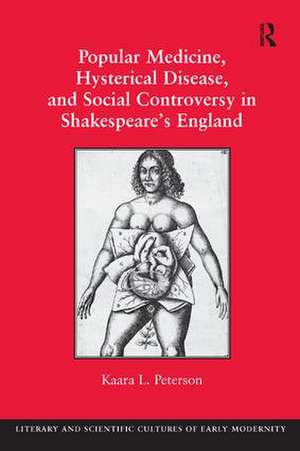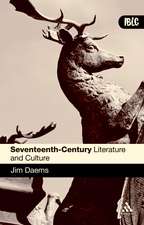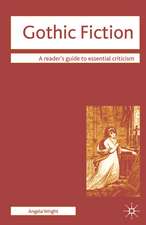Popular Medicine, Hysterical Disease, and Social Controversy in Shakespeare's England
Autor Kaara L. Petersonen Limba Engleză Hardback – 14 iul 2010
| Toate formatele și edițiile | Preț | Express |
|---|---|---|
| Paperback (1) | 461.03 lei 6-8 săpt. | |
| Taylor & Francis – 26 oct 2016 | 461.03 lei 6-8 săpt. | |
| Hardback (1) | 1114.70 lei 6-8 săpt. | |
| Taylor & Francis – 14 iul 2010 | 1114.70 lei 6-8 săpt. |
Preț: 1114.70 lei
Preț vechi: 1359.39 lei
-18% Nou
Puncte Express: 1672
Preț estimativ în valută:
213.30€ • 223.16$ • 177.19£
213.30€ • 223.16$ • 177.19£
Carte tipărită la comandă
Livrare economică 02-16 aprilie
Preluare comenzi: 021 569.72.76
Specificații
ISBN-13: 9780754669937
ISBN-10: 0754669939
Pagini: 230
Dimensiuni: 156 x 234 x 14 mm
Greutate: 0.61 kg
Ediția:1
Editura: Taylor & Francis
Colecția Routledge
Locul publicării:Oxford, United Kingdom
ISBN-10: 0754669939
Pagini: 230
Dimensiuni: 156 x 234 x 14 mm
Greutate: 0.61 kg
Ediția:1
Editura: Taylor & Francis
Colecția Routledge
Locul publicării:Oxford, United Kingdom
Notă biografică
Kaara L. Peterson is Associate Professor of English Literature at Miami University, USA. She is working on a new project about the portrayal of virginity in early modern literature and art.
Recenzii
'The strength of this work lies in the originality and rigour of its analysis, the richness of its research and primary source material, its close engagement with contemporary medical debates, and its contribution to interpretations of important dramatic texts. Kaara Peterson not only competently and intelligently situates her study within existing scholarship but she also breaks new ground to bring us an absorbing book full of exciting new insights into the role of a complex and fascinating conundrum in the medical history of the female body in the early modern English cultural imagination.' Louise Noble, University of New England, Australia ’...a valuable addition to scholarship of the early modern period and will be of particular use to readers interested in historical understandings of female health, medicine in literature, Shakespeare scholarship and representations of women on the early modern stage.’ British Society for Literature and Science 'In elucidating hysterica passio through meticulous attention to primary texts, set in dialogue with each other and with literary representations, it makes an important contribution to the understanding of medicine in early modern England, particularly with regard to gender and the gendered aspects of disease.' Renaissance Quarterly 'Replete with extensive notes and bibliography, Peterson's book does what the author sets out to achieve; it demonstrates that since the time of Hippocrates fits of hysteria were thought to be exclusively female and uterine in origin and that this assumption had been completely absorbed and understood by the general public, as evident in Tudor literature. Peterson is at her best when she integrates contemporary medical opinion, well-known cases of bad female behavior, and theatrical dialogue. ... contribute[s] to a better understanding of some complex scenes in early modern English drama and to what audiences understood about their meaning then that we do not now.' Journal of British S
Cuprins
Introduction; Chapter 1 1With a few minor alterations, the portions of this chapter discussing King Lear first appeared in Shakespeare Quarterly 57.1 (Spring 2006): 1–22 as “Historica Passio: King Lear, Early Modern Medicine, and Editorial Practice.”; Chapter 2 1 An early version of some portions of this chapter appeared as “Shakespearean Revivifications: Early Modern Undead” in Shakespeare Studies XXXII (Fall 2004): 40–66; Chapter 3 “The Ink of Lovers”: Revenge Tragedy’s Blood Letters; Chapter 4 1An earlier, shorter version of some parts of this chapter appeared as “Performing Arts: Hysterical Disease, Exorcism, and Shakespeare’s Theater” in Disease, Diagnosis, and Cure on the Early Modern Stage, ed. Stephanie Moss and Kaara L. Peterson (Burlington, VT and Aldershot, UK: Ashgate, 2004) 3–30; epilo Epilogue Hermione’s Legacy, or Hysteria after 1700;
Descriere
Mining a series of previously uncharted conversations springing up in 16th- and 17th-century popular medicine and culture, this study explores early modern England's significant and sustained interest in the hysterical diseases of women. Kaara L. Peterson assembles a fascinating collection of medical materials to support her discussion of contemporary debates about varieties of uterine pathologies and the implications of these debates for our understanding of drama's representation of hysterica passio cases in particular, among other hysterical maladies.
















